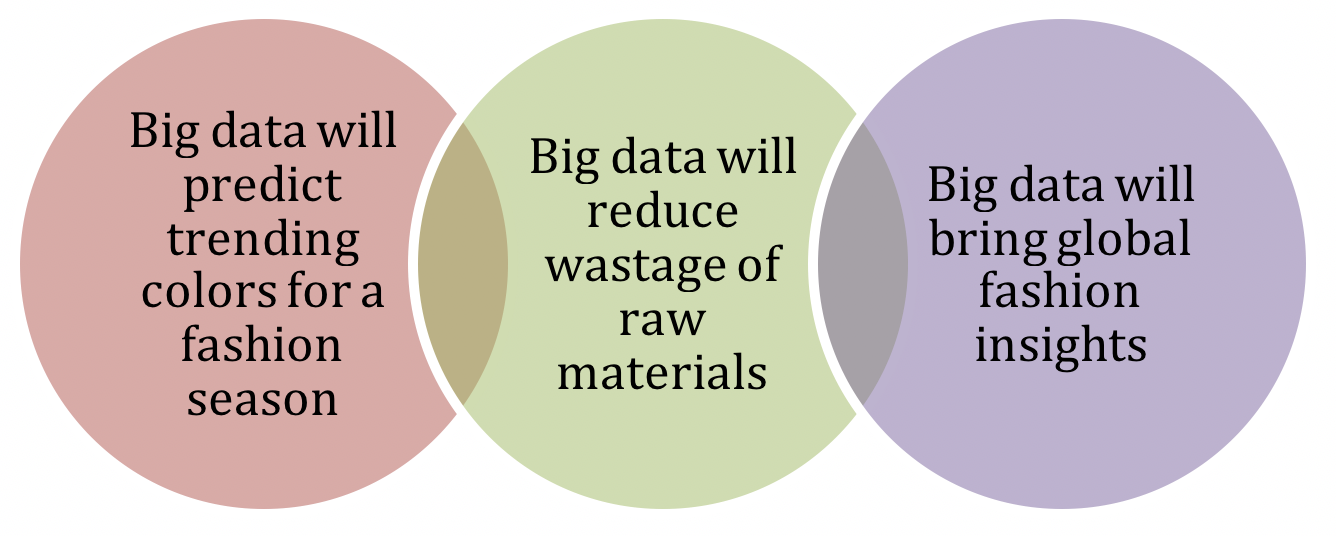Big Data is Stepping into the Fashion World
Big Data is Stepping into the Fashion World

Big data is changing the way designers create and market their clothing. The application of big data in the fashion industry is not only helping designers understand customer preferences but also assisting them to better market their products. The fashion industry appeals to everyone in the world on one level or another, but each item of clothing sells to different types of customers.
Many industries have leveraged the power of big data and the fashion industry is the latest one to capitalise on the technology. The reason for industrial success with big data is the generation and assimilation of data high on volume, veracity, and variety. Big data analytics analyzes data - organized or disorganized - and gives industries actionable insights. Such insights help industries improve their services, predict market trends, and stay ahead of competitors.
The fashion industry collects a large volume of consumer data, including their fashion taste, needs, interests and preferences from multiple sources with the aim to improve their products. Editd, a big data tool for retailers, supports fashion retailers with the pricing of fashion items and accessories, and also in marketing the products better. The tool gauges the sentiments of customers with the help of data stream from different social media platforms. So, big data is already making its presence felt.

By collecting a large volume of data, from various sources, big data can reveal hot fashion trends and latest customer preferences, before anyone else in the industry. Sounds cool, right? So, let’s see what the different applications of big data in the fashion industry look like:
A common concern faced by most fashion retailers is understanding their competitors' strategies. With an appropriate big data tool in use, retailers can finally get live insights on how their competitors are creating and executing successful fashion campaigns. With such insights, fashion retailers can strategize their campaigns better than their peers. Big data can help fashion retailers launch their products and engage with customers at the right time, in the right way.
Retailers can use big data to match products with the right audience, eliminating the possibility to hoard or fall short of supply. Furthermore, big data helps reduce wastage of raw material. Big data can accurately predict how big or small the audience for a particular fashion event. Such predictions help designers to create taillored products.
Trends are hard to master with traditional monitoring techniques. Analysing what going to become the next biggest thing is just what you need, to master fashion retail businesses. A major drawback faced by many retailers is missing on shoppers who are interested but not converting. Markdown optimisation analyses customer behaviour to suggest a price that ignites demand and ensures stock clearance both while ascertaining a rise in overall profits. This technique can be especially helpful to increase the effectiveness of clearance sales at the end of every season.
Ralph Lauren is also leveraging the power of big data by attaching sensors to their polo shirts to track buyers’ fitness level. With the help of a smartphone application, buyers can keep track of their health whenever they wear a Ralph Lauren polo.
By using data analysis techniques like market basket analysis you can analyse which products consumers are likely to buy in future. This technique uses data from historical purchases to identify which products go well along with each other. Using this data you can effectively organise your store both online and offline and send more effective marketing messages. Market basket analysis can make it easy for you to upscale revenues by helping you cross-sell more efficiently.
In order to stay relevant amidst the growing competition in the fashion industry, it is important for designers to come up with the most unique items. By integrating big data with similar technologies such as artificial intelligence, machine learning, and the Internet of Things (IoT), retailers can analyse real-time insights to create the next generation of innovative fashion trends.
Naveen Joshi
Tech Expert
Naveen is the Founder and CEO of Allerin, a software solutions provider that delivers innovative and agile solutions that enable to automate, inspire and impress. He is a seasoned professional with more than 20 years of experience, with extensive experience in customizing open source products for cost optimizations of large scale IT deployment. He is currently working on Internet of Things solutions with Big Data Analytics. Naveen completed his programming qualifications in various Indian institutes.
Trending
1 Exploring the Versatility of LEXAN™ Film in Industries
Daniel Hall2 AI-Powered Cyber Threats Set to Surge in 2025, Google Cloud Warns
Fabrice Beaux3 How to Search Instagram by Phone Number Without an Account
Daniel Hall4 The Rise of Visual Search: Why It's More Important Nowadays
Daniel Hall5 How Are New Innovations Making Sports Safer and More Effective for Athletes?
Daniel Hall

